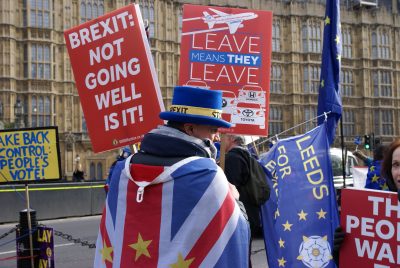“Stop the Coup, Defend Democracy”, Thousands Shout in the UK. “Another Europe is Possible”
British citizens rejected the closure of Parliament, which they consider Boris Johnson's maneuver to force a "Hard Brexit" on October 31.

In response to the “Stop the Coup” call made by the “Another Europe is Possible” movement, thousands of people took to the streets in London, Manchester, Oxford, Glasgow, Birmingham, Brighton, Swansea, Bristol, Liverpool and other cities to reject the five-weeks closure of the Parliament prompted by Prime Minister Boris Johnson.
In Central London, near Downing Street where the PM’s official residence is located, the British “shouted ‘What do we want? Democracy! When do we want it? Now!’, ‘Boris Johnson, shame on you’ and ‘Hey, hey, ho, ho, Boris Johnson’s got to go’,” The Guardian reported.
“The public outrage at Boris Johnson shutting down democracy has been deafening. People are right to take to the streets,” the Labour Party leader Jeremy Corbyn said and encouraged “everyone to join the demonstrations in London and across the country.”
Consequently with such widespread feeling, demonstrations in at least 32 cities, in Britain and Northern Ireland, were reported by local media until Saturday noon.
This massive response was expected to be accompanied by other unusual actions in this country: Momentum, a left-wing organization attached to the Labor Party, called to occupy bridges and block roads.
Fantastic diverse turn out of young people at todays protest. 🇪🇺The government and #Boris needs to listen to these young people protesting for their futures 💯#Brexit #FBPE #StopBoris #DefendOurDemocracy #DefendDemocracy#StopTheCoup #BlockTheCoup #StopTheBrexitCoup #brexitcoup pic.twitter.com/ZEGHSWG6mu
— Marley2023 (@Marley20231) August 31, 2019
“Disruption is the only form of leverage protesters can rely on,” said Michael Chessum, the former president of the University of London students’ union, who describes himself as “hard left,” The Telegraph reported.
“Ultimately we are not going to persuade Boris Johnson to change his mind through some intellectual exercise… this process needs to force the government to change its course,” he added.
As part of his offers to his supporters, PM Johnson pledged to take Britain out of the European Union (EU) on Oct. 31. In order to do so, he asked Queen Elizabeth to shut the British parliament for around three weeks.
This move is aimed at hindering efforts by his political opponents to stop him from performing a “Hard Brexit”, whereby the U.K. will leave not only the EU institutions but also the EU single market and customs union.
Today thousands of people attended #stopthecoup protests across the #UK. At the London protest, attended by an estimated 30,000 people, I spoke to Mo Silvester. #StopTheCoup #StopTheBrexitCoup #DefendOurDemoracy@telesurenglish pic.twitter.com/WlvtwFQD9W
— Pablo Navarrete (@pablo_telesur) August 31, 2019
“A Hard Brexit would still require the U.K. to pay a divorce settlement to the EU as part of a withdrawal treaty, but it would not require the U.K. to sign up to the free movement of EU nationals or be subject to the European Court of Justice,” the Investec Bank’s webpage explained.
“The U.K. would also be able to sign independent free-trade deals with any country without any restrictions.”
The Hard Brexit option might be, however, accompanied by sensitive economic and political problems. If the British parliament were not closed, opposition lawmakers could discuss them and pass legislation to avoid a no-deal Brexit, when they return from their summer recess on Sep. 3.
Among the most worrying issues of a hard departure is the so-called “Irish Backstop”, which is part of the withdrawal agreement negotiated between the EU and former PM Theresa May. According to this safeguard, the U.K will commit to keep its border with the Republic of Ireland open.
PM Johnson wants the backstop removed, for it could leave Northern Ireland operating under different regulatory rules than the rest of the U.K. The EU and Ireland say Britain has yet to come up with acceptable alternatives.
*
Note to readers: please click the share buttons above or below. Forward this article to your email lists. Crosspost on your blog site, internet forums. etc.
Featured image is from Wikimedia Commons

